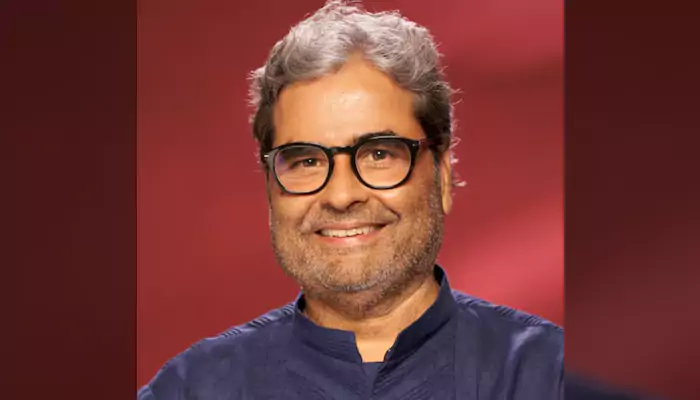
As he turns 60, we celebrate the man who made the Bard walk the gallis of Mumbai, bleed in the dust of Uttar Pradesh, and rage in the valleys of Kashmir
Born on August 4, 1965, the composer-turned-auteur celebrates 60 remarkable years today. While many filmmakers reinterpret ideas, Vishal Bhardwaj rewires them—often employing poetry, politics, and haunting melodies as his tools. His artistic journey is not merely a story of directorial brilliance but also one of fearless storytelling, adaptation, and innovation.
It was not a carefully planned homage that sparked Bhardwaj's love affair with William Shakespeare. During a train journey with his godson, he picked up an abridged version of Macbeth out of sheer boredom. What ensued was an artistic epiphany. That train didn't just cross towns — it crossed centuries. By the time he returned to Mumbai, the seeds of Maqbool had already been sown.

Later, he would adapt Othello into Omkara and Hamlet into Haider, completing his Shakespearean trilogy. Each film didn't merely adapt the Bard — they Indianised him in ways that made the conflicts feel both epic and earthy, timeless and terrifying.
Maqbool (2003) is more than just Macbeth set in a Mumbai gangster environment — it examines ambition, love, loyalty, and sin, told through Bhardwaj's distinctive moodiness.

Credit: Indian Express
Irrfan Khan's Miyan Maqbool, Tabu's haunting Nimmi, and Pankaj Kapur's formidable Abbaji are complex characters written with moral ambiguity. The three witches? Reinterpreted as corrupt policemen (played by Naseeruddin Shah and Om Puri), whose prophetic wit combines black comedy with street-smart clairvoyance.
This was not imitation — it was a respectful interpretation. An homage that did not submit but stood shoulder to shoulder with its source.
Next came Omkara (2006), set in the lawless heartland of western Uttar Pradesh. With its raw dialects, caste dynamics, and brutal politics, it transformed the Venetian general into a political enforcer — Omkara Shukla — played powerfully by Ajay Devgn.

Credit: Bollywood Hungama
The characters were not just borrowed from Shakespeare; they were reincarnated, their motivations rooted in the Indian psyche. Saif Ali Khan's Langda Tyagi (Iago) became an icon of treachery. Bhardwaj's adaptation didn't just retain the original's backbone — it gave it a new skin, new bones, and new fire.
Haider (2014) was perhaps his most politically daring film. Set in the insurgency-ridden Kashmir of the 1990s, it transformed Hamlet's existential despair into the psychological breakdown of a young man navigating betrayal, violence, and the weight of inherited grief.

Credit: TOI
Haider didn't just appeal to lovers of Shakespeare. It challenged authority, questioned nationhood, and mourned innocence. With haunting visuals, devastating monologues, and a score that echoed both pain and poetry, it won national awards — and worldwide admiration.
Although often celebrated for his trilogy, Bhardwaj's talent goes far beyond adaptations. He started as a music composer, creating scores for Gulzar's Maachis and Satya. Even now, his soundtracks — frequently made with his wife Rekha Bhardwaj as vocalist — embody the essence of his storytelling, whether in Dhan Te Nan, Namak Ishq Ka, or Aao Na.
Credit: Metaphor LitFest
His films — The Blue Umbrella, Kaminey, 7 Khoon Maaf, and Talvar — demonstrate a director unafraid of embracing the unusual. He mixes the surreal with the real, the poetic with the raw, shaping a cinema that reflects, challenges, and stays with you.
Happy 60th birthday, maestro. Your films have shown us that adaptation isn't mimicry — it's metamorphosis. Through this, you've made Shakespeare speak Hindi, breathe Urdu, and dream in verse once more.